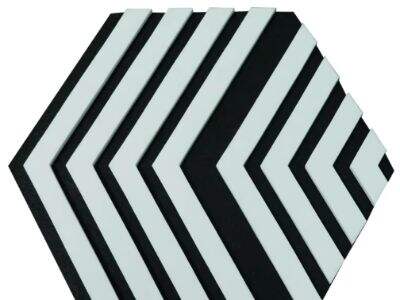Goed akoestiese houtmuurpanele kan help om u ruimte klankdig te maak, dus is dit belangrik om dit reg te doen. Dit is maklik om eenvoudige foute oor die hoof te sien wat klank kan laat deurslaan. Hieronder is 'n gids oor hoe u hierdie foute kan vermy en die beste resultaat kan behaal wanneer u u JIANG FEN BEI Akustiese Stirofoam panele gebruik.
Posisionering Van Panele Vir Beste Klankdemping
Om geraas buite te hou, is dit krities dat die panele presies reguit geplaas word. As hulle selfs net effens skeef is, kan klank deursluip. Begin deur seker te maak dat die eerste paneel loodreg en reguit is; gebruik 'n waterpas teen die muur. Vervolgens moet elke nuwe paneel styf teen die vorige ingepas word. Op hierdie manier kan jy 'n stewige klankbarrière vorm.
Vermy Gaping en Oorvleuelende Panele
Byvoorbeeld, 'n algemene fout is klein leë spasies tussen die panele of ligte oorvleueling van hulle. Nou kan krake soos hierdie 'n groot saak wees, omdat dit plekke is waar klank ingestoot kan word. Maak seker van akkurate meting en sny jou panele korrek. As jy nie seker is nie, kies eerder om 'n stukkie effens groter te sny en dit dan aan te pas, eerder as om dit te klein te sny en 'n gaping te skep.
Die Toepassing van die Regte Lym vir Veilige Aanhegting
Die keuse van gom of kleefstof wat u gebruik, is van die allergrootste belang. Ander mense verkies om te gebruik wat hulle reeds het, maar dit mag dalk nie die panele goed genoeg vaslê nie. JIANG FEN BEI stel 'n kleefstof voor wat u kan gebruik, 'n spesiale kleefstof vir "akoustiese panele". Dit sal verseker klankabsorberende houtwandpanele dat u panele op hul plek bly en nie toelaat dat klank deurkom nie.
Rante en hoeke kan moeilike plekke wees waardeur klank graag ontsnap. Dit is wyse om hierdie areas ekstra goed te verseël. U kan enige klein gate vul met 'n akoustiese seëlmiddel of kit. Wanneer u hierdie JIANG FEN BEI akustieke houtmuurpanele , doen u u deel om die vertrek stiller te maak.
Behoue Tegels Reg en Vlak vir Beste Audio-Resultate
Moet uiteindelik seker maak dat u panele nie net met mekaar uitgelyn is nie, maar ook regop en vlak op u muur is. Indien die oppervlakke skuins (leun) of nie vlak is nie, sal hulle nie so goed werk om klank te blok nie. Gebruik 'n waterpas om elke paneel terwyl u gaan, dop te hou. Dit kan monteer 'n bietjie stadiger maak, maar die ekstra gelluiseerming is dit werd.

